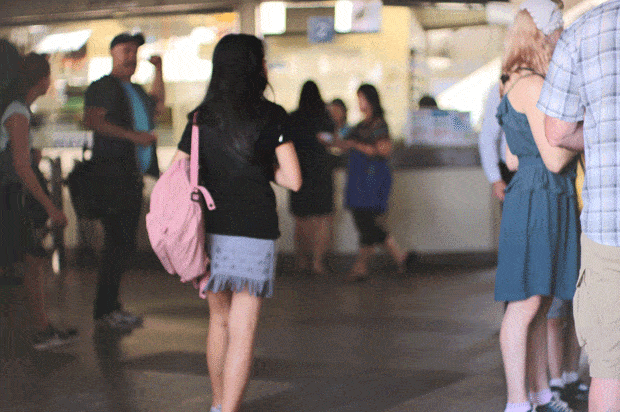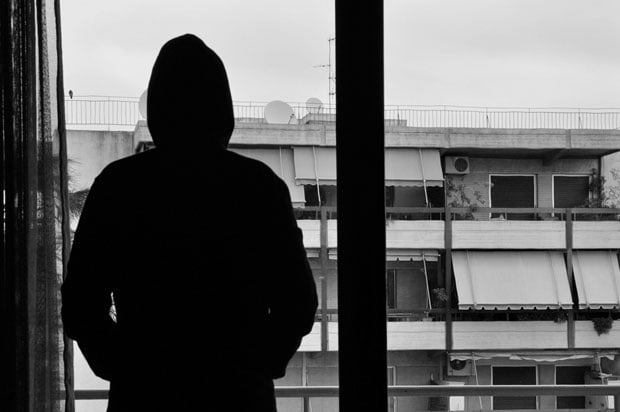Help! I have social anxiety
Some public toilets are gross. We're all agreed on that. But while some of us have perfected the no-contact squat or can deal with putting toilet paper on the loo seat, a lot of people have a serious fear of going to the toilet outside of home. The Mix spoke to Dr Eve Fleming from ERIC, the bowel and bladder charity, to explore this fear and seek support.

Deep breath. One step at a time.
Having a fear of going to the toilet is a real thing, so much so that there are two names for this phobia: Parcopresis, a fear of pooing in public, and Paruresis, a fear of weeing in public. It’s estimated that around four million people in the UK (6% of the population) struggle with this, and that number is likely too low due to most people being too embarrassed to admit it.
This fear doesn’t have to be related to public toilets, either. It can mean being too afraid to use any toilet outside of home, including at family and friends’ houses.
How do you know if you have a real phobia of pooing in public?
“The main difference is in the strength of the feelings people have,” Eve says. “If someone has a real fear, it is difficult both for the person [and] others to reason with [that fear]. Like with any phobia, it often isn’t rational and affects everyday life.
Most of us might prefer to hold in a brewing poo until we get home, but will fork out the 50p to use the public toilet in the train station if we have to. But others might worry before they’ve started needing the loo or before they’ve even left the house. It’s always on their mind, and the uncomfortable feeling of knowing you need to use a public toilet is much stronger.
They may hold on to a wee or poo for a long time which is unhealthy and can lead to constipation, and may even need treatment. You can visit ERIC’s website to read up on these bowel and bladder problems.
What are these strong, fearful feelings?
Those who struggle with going to the toilet in public may experience feelings similar to panic attacks or general anxiety, which are physical as well as mental. Some symptoms could be:
- Rapid heartbeat and breathing
- Sweating
- Dizziness
- Crying
- Feeling sick
- Dry mouth
These feelings don’t have to occur in the presence of a public toilet or at the time of needing the loo, they could occur just from thinking about having to go.
Where does this phobia come from?
It’s hard to say, but phobias are often related to a bad past experience, most commonly as a child. It could also be related to another mental health problem, such as OCD (Obsessive Compulsive Disorder) or GAD (General Anxiety Disorder).
The most important thing to know is that it’s not your fault if you struggle with this phobia, and you shouldn’t feel embarrassed or like a failure.
This is definitely me. Can I get over this phobia?!
There are a number of things you can do and there are lots of people who can support you. If you’re struggling, you can speak to someone, whether that’s a parent, friend, teacher, GP, or online service like here at The Mix.
ERIC has lots of advice here on how to tell people you have a bowel or bladder problem.
The first step is to recognise you have a problem and be kind to yourself. You may struggle with this but it doesn’t define you, and you can overcome it.
It may be useful to tackle the anxiety effects before the phobia itself:
- Practice slowing down your breathing
- Practice mindfulness
- Use coping techniques, like counting to 10
You can read our article here on what to do if you’re having a panic attack, which might be helpful for you.
Eve has some great advice: “Sometimes if it is severe, it can help to break the experience up into smaller bits. This might be first getting used to just going into the toilet, without using it, perhaps just washing hands and then doing a bit more such as practicing sitting on the seat until they feel confident enough to use the toilet.”
How can I help a friend with this?
It can be hard to see your friend go through something like this, especially if you can’t understand why. But the best thing to do is listen, not judge, and not dismiss their feelings.
“Ask what they would like you to do to help,” Eve says. “These things aren’t always logical or reasonable [but] it can help to chat, sing, hold their hand and to do relaxation exercises – whatever they find useful.”
For more information, visit ERIC’s website or call their helpline on 0845 370 8008 (calls cost 9.6p per minute plus your standard network charge) or visit Anxiety UK for further support on this phobia.
Next Steps
- ERIC supports young people with bowel or bladder conditions. Call their helpline on 0845 370 8008 Monday to Thursday 10am–2pm or email: [email protected]. Calls cost 9.6p per minute, plus the phone company's access charge.
- AnxietyUK run helplines, email support, live chats and therapy services for people with anxiety disorders. 08444 775 774
- Chat about this subject on our Discussion Boards.
By
Updated on 31-Mar-2017
No featured article










